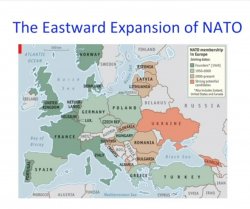Jaa, että pitäis 40 min videota katsoa. Sit wall of tekstiin kätket tämän:
Etkö nyt voinu vaa suoraan sanoa, että natoa vastustat ja oot naapurin palkkaama.
Ei väki nyt voi oikeasti näin yksisilmäistä olla. Rasittavan typerää, kun joku yrittää tuoda mukana taustoitusta tai vähän enemmän nyanssia näin "nyt kaikki Natoon, saatana" -rummutuksen sijaan, niin vastaus on jälleen kerran - kuten aina - "öhö öhö, Putinin mielistelijä."
Ei tuo professori nyt kovin tyhmältä vaikuta. Enkä pysty ymmärtämään, miksi miksi on mahdoton ajatus tajuta, että nämä ongelmat ovat monisyisiä.
Vaikka kukaan lännessä ei pysty käsittämään, miksi kukaan järjissään oleva pelkäisi NATO:n hyökkäävän Venäjään, pystyn kyllä jollakin tasolla tajuamaan sen toisen puolenkin järkeilyä.
On kaksi eri asiaa pohtia sotaan johtaneen kriisin taustoja ja käynnissä olevan sodan kauheutta ja turhuutta.
"
John Joseph Mearsheimer (
/ˈmɪərʃaɪmər/; born December 14, 1947) is an American
political scientist and
international relations scholar, who belongs to the realist school of thought. He is the R. Wendell Harrison Distinguished Service Professor at the
University of Chicago. He has been described as the most influential realist of his generation.
[3]
...

en.wikipedia.org
In September 2014, Mearsheimer wrote the article "Why the Ukraine Crisis Is the West's Fault. The Liberal Delusions That Provoked Putin," which was published in
Foreign Affairs. The essay was highly critical of the US policy since the end of the Cold War towards Russia.
[76] Mearsheimer argued that Russian intervention in
Crimea and Ukraine had been motivated by what he saw as the irresponsible strategic objectives of NATO in Eastern Europe. He compared NATO expansion into Eastern Europe, led by NATO, and the planned inclusion of Ukraine to the hypothetical scenario of a Chinese military alliance in North America: "Imagine the American outrage if China built an impressive military alliance and tried to include Canada and Mexico."
Mearsheimer argued that Russia's annexation of the Crimea had been fueled by concerns that it would lose access to its
Black Sea Fleet naval base at
Sevastopol if Ukraine continued to move towards NATO and
European integration. Mearsheimer concluded that US policy should shift to recognize Ukraine as a
buffer state between NATO and Russia, rather than attempt to absorb Ukraine into NATO.
[76] Mearsheimer's article provoked
Michael McFaul and
Stephen Sestanovich to publish their response in the November/December 2014 issue of
Foreign Affairs.
[77]

